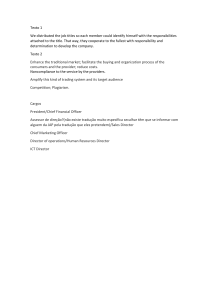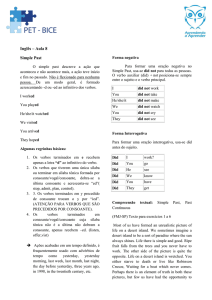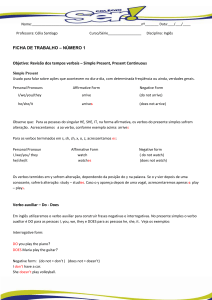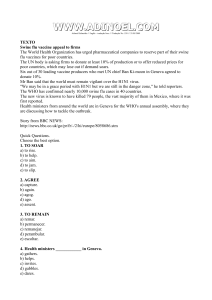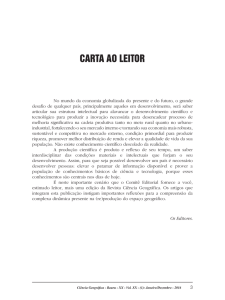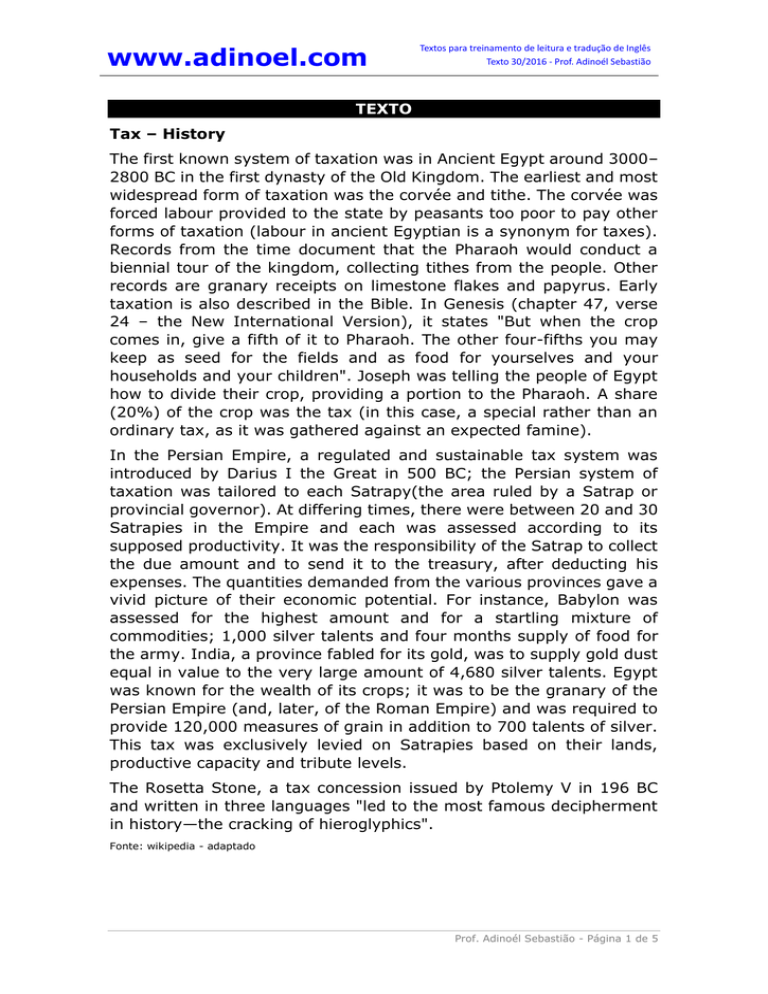
www.adinoel.com
Textos para treinamento de leitura e tradução de Inglês
Texto 30/2016 - Prof. Adinoél Sebastião
TEXTO
Tax – History
The first known system of taxation was in Ancient Egypt around 3000–
2800 BC in the first dynasty of the Old Kingdom. The earliest and most
widespread form of taxation was the corvée and tithe. The corvée was
forced labour provided to the state by peasants too poor to pay other
forms of taxation (labour in ancient Egyptian is a synonym for taxes).
Records from the time document that the Pharaoh would conduct a
biennial tour of the kingdom, collecting tithes from the people. Other
records are granary receipts on limestone flakes and papyrus. Early
taxation is also described in the Bible. In Genesis (chapter 47, verse
24 – the New International Version), it states "But when the crop
comes in, give a fifth of it to Pharaoh. The other four-fifths you may
keep as seed for the fields and as food for yourselves and your
households and your children". Joseph was telling the people of Egypt
how to divide their crop, providing a portion to the Pharaoh. A share
(20%) of the crop was the tax (in this case, a special rather than an
ordinary tax, as it was gathered against an expected famine).
In the Persian Empire, a regulated and sustainable tax system was
introduced by Darius I the Great in 500 BC; the Persian system of
taxation was tailored to each Satrapy(the area ruled by a Satrap or
provincial governor). At differing times, there were between 20 and 30
Satrapies in the Empire and each was assessed according to its
supposed productivity. It was the responsibility of the Satrap to collect
the due amount and to send it to the treasury, after deducting his
expenses. The quantities demanded from the various provinces gave a
vivid picture of their economic potential. For instance, Babylon was
assessed for the highest amount and for a startling mixture of
commodities; 1,000 silver talents and four months supply of food for
the army. India, a province fabled for its gold, was to supply gold dust
equal in value to the very large amount of 4,680 silver talents. Egypt
was known for the wealth of its crops; it was to be the granary of the
Persian Empire (and, later, of the Roman Empire) and was required to
provide 120,000 measures of grain in addition to 700 talents of silver.
This tax was exclusively levied on Satrapies based on their lands,
productive capacity and tribute levels.
The Rosetta Stone, a tax concession issued by Ptolemy V in 196 BC
and written in three languages "led to the most famous decipherment
in history—the cracking of hieroglyphics".
Fonte: wikipedia - adaptado
Prof. Adinoél Sebastião - Página 1 de 5
www.adinoel.com
Textos para treinamento de leitura e tradução de Inglês
Texto 30/2016 - Prof. Adinoél Sebastião
TEXTO – TRADUÇÃO LIVRE
Como os parágrafos desse texto são grandes. Vamos fazer a tradução
período a período para facilitar a visualização.
Tax – History
Imposto – História
Tradução Livre – primeiro parágrafo do texto
The first known system of taxation was in Ancient Egypt around 3000–
2800 BC in the first dynasty of the Old Kingdom.
O primeiro sistema conhecido de tributação aconteceu no Egito
Antigo cerca de 3000-2800 AC na primeira dinastia do Old Kingdom.
BC (before Christ) = AC (antes de Cristo).
The earliest and most widespread form of taxation was the corvée and
tithe.
A forma mais precoce e mais espalhada de tributação foi a prestação
pessoal de serviço não remunerado e o dízimo.
Corvée = prestação pessoal de serviço não remunerado.
Tithe = dízimo.
The corvée was forced labour provided to the state by peasants too
poor to pay other forms of taxation (labour in ancient Egyptian is a
synonym for taxes).
A prestação pessoal de serviço não remunerado era trabalho forçado
previsto pelo estado para os camponeses muito pobres para pagar
outras formas de tributação (trabalho no Egito Antigo é sinônimos de
impostos).
Records from the time document that the Pharaoh would conduct a
biennial tour of the kingdom, collecting tithes from the people.
Registros de documentos da época mostram que o Faraó poderia
conduzir uma excursão bienal pelo reino, coletando dízimos do povo.
Prof. Adinoél Sebastião - Página 2 de 5
www.adinoel.com
Textos para treinamento de leitura e tradução de Inglês
Texto 30/2016 - Prof. Adinoél Sebastião
Other records are granary receipts on limestone flakes and papyrus.
Outros registros são recebimento do celeiro (parte da produção) em
lascas de calcário e papiro.
Granary = celeiro.
Early taxation is also described in the Bible.
A tributação dessa época está também descrita na Bíblia.
In Genesis (chapter 47, verse 24 – the New International Version), it
states "But when the crop comes in, give a fifth of it to Pharaoh. The
other four-fifths you may keep as seed for the fields and as food for
yourselves and your households and your children".
No Genesis (capítulo 47, verso 24 – na Nova Versão Internacional),
afirma-se “Mas quando a colheita vier, dê um quinto disso para o
Faraó. As outras quatro partes vocês podem manter como semente
para os campos e como comida para vocês mesmos e suas famílias e
suas crianças”.
Joseph was telling the people of Egypt how to divide their crop,
providing a portion to the Pharaoh.
José estava dizendo para o povo do Egito como dividir sua colheita,
proporcionando uma porção para o Faraó.
A share (20%) of the crop was the tax (in this case, a special rather
than an ordinary tax, as it was gathered against an expected famine).
Uma parte (20%) da colheita era o imposto (neste caso, um especial
em vez de um imposto ordinário, uma vez que foi recolhido contra uma
fome esperada).
Prof. Adinoél Sebastião - Página 3 de 5
www.adinoel.com
Textos para treinamento de leitura e tradução de Inglês
Texto 30/2016 - Prof. Adinoél Sebastião
Tradução Livre – segundo parágrafo do texto
In the Persian Empire, a regulated and sustainable tax system was
introduced by Darius I the Great in 500 BC; the Persian system of
taxation was tailored to each Satrapy (the area ruled by a Satrap or
provincial governor).
No Império Persa, um sistema de imposto regulamentado e
sustentável foi introduzido por Darius I o Grande em 500 AC; o sistema
Persa de tributação foi costurado (adaptado) para cada Satrapy (a área
governada por um Satrap ou governador provincial).
At differing times, there were between 20 and 30 Satrapies in the
Empire and each was assessed according to its supposed productivity.
Em diferentes momentos, havia entre 20 e 30 Satrapies no Império e
cada um era avaliado de acordo com sua suposta produtividade.
It was the responsibility of the Satrap to collect the due amount and to
send it to the treasury, after deducting his expenses.
Era responsabilidade do Satrap recolher a quantidade devida para
enviá-la para o tesouro, após deduzir suas despesas.
The quantities demanded from the various provinces gave a vivid
picture of their economic potential.
As quantidades demandadas de várias províncias davam uma imagem
viva do seu potencial econômico.
For instance, Babylon was assessed for the highest amount and for a
startling mixture of commodities; 1,000 silver talents and four months
supply of food for the army.
Por exemplo, a Babilônia era avaliada pela mais alta quantia e pela
mistura surpreendente de mercadorias; 1.000 talentos de prata e
quatro meses de fornecimento de comida para o exército.
Prof. Adinoél Sebastião - Página 4 de 5
www.adinoel.com
Textos para treinamento de leitura e tradução de Inglês
Texto 30/2016 - Prof. Adinoél Sebastião
India, a province fabled for its gold, was to supply gold dust equal in
value to the very large amount of 4,680 silver talents.
Índia, uma província famosa pelo seu ouro, tinha que fornecer ouro
em pó igual ao valor de uma grande quantidade de 4.680 talentos de
prata.
Egypt was known for the wealth of its crops; it was to be the granary
of the Persian Empire (and, later, of the Roman Empire) and was
required to provide 120,000 measures of grain in addition to 700
talents of silver.
O Egito era conhecido pela riqueza de suas colheitas; ele era o celeiro
do Império Persa (e, mais tarde, do Império Romano) e era requisitado
para fornecer 120.000 medidas de grãos, além de 700 talentos de
prata.
This tax was exclusively levied on Satrapies based on their lands,
productive capacity and tribute levels.
Este imposto era exclusivamente cobrado sobre Satrapies baseado
sobre suas terras, capacidade produtiva e níveis de tributos.
Tradução Livre – terceiro parágrafo do texto
The Rosetta Stone, a tax concession issued by Ptolemy V in 196 BC
and written in three languages "led to the most famous decipherment
in history—the cracking of hieroglyphics".
A Rosetta Stone, um benefício fiscal distribuído por Ptolemy V em
196 AC e escrito em três línguas “levou a mais famosa decifração na
história – a decifração dos hieróglifos”.
Tax concession = benefício fiscal, benefício tributário.
Prof. Adinoél Sebastião - Página 5 de 5

